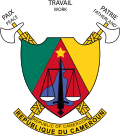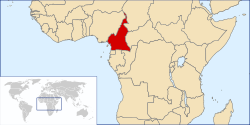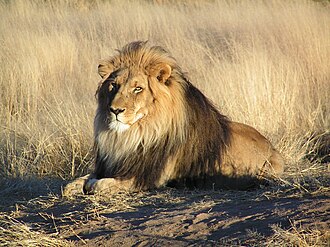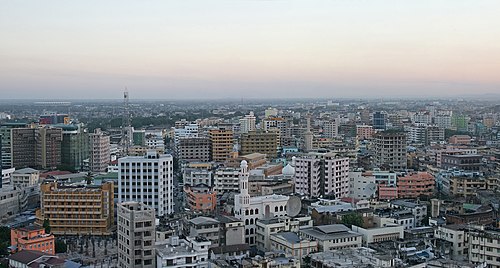Portal:Africa



Africa is the world's second-largest and second-most populous continent after Asia. At about 30.3 million km2 (11.7 million square miles) including adjacent islands, it covers 20% of Earth's land area and 6% of its total surface area. With nearly 1.4 billion people as of 2021, it accounts for about 18% of the world's human population. Africa's population is the youngest among all the continents; the median age in 2012 was 19.7, when the worldwide median age was 30.4. Based on 2024 projections, Africa's population will exceed 3.8 billion people by 2100. Africa is the least wealthy inhabited continent per capita and second-least wealthy by total wealth, ahead of Oceania. Scholars have attributed this to different factors including geography, climate, corruption, colonialism, the Cold War, and neocolonialism. Despite this low concentration of wealth, recent economic expansion and a large and young population make Africa an important economic market in the broader global context, and Africa has a large quantity of natural resources.
Africa is highly biodiverse; it is the continent with the largest number of megafauna species, as it was least affected by the extinction of the Pleistocene megafauna. However, Africa is also heavily affected by a wide range of environmental issues, including desertification, deforestation, water scarcity, and pollution. These entrenched environmental concerns are expected to worsen as climate change impacts Africa. The UN Intergovernmental Panel on Climate Change has identified Africa as the continent most vulnerable to climate change.
The history of Africa is long, complex, and varied, and has often been under-appreciated by the global historical community. In African societies the oral word is revered, and they have generally recorded their history via oral tradition, which has led anthropologists to term them "oral civilisations", contrasted with "literate civilisations" which pride the written word. African culture is rich and diverse both within and between the continent's regions, encompassing art, cuisine, music and dance, religion, and dress.
Africa, particularly Eastern Africa, is widely accepted to be the place of origin of humans and the Hominidae clade, also known as the great apes. The earliest hominids and their ancestors have been dated to around 7 million years ago, and Homo sapiens (modern human) are believed to have originated in Africa 350,000 to 260,000 years ago. In the 4th and 3rd millennia BCE Ancient Egypt, Kerma, Punt, and the Tichitt Tradition emerged in North, East and West Africa, while from 3000 BCE to 500 CE the Bantu expansion swept from modern-day Cameroon through Central, East, and Southern Africa, displacing or absorbing groups such as the Khoisan and Pygmies. Some African empires include Wagadu, Mali, Songhai, Sokoto, Ife, Benin, Asante, the Fatimids, Almoravids, Almohads, Ayyubids, Mamluks, Kongo, Mwene Muji, Luba, Lunda, Kitara, Aksum, Ethiopia, Adal, Ajuran, Kilwa, Sakalava, Imerina, Maravi, Mutapa, Rozvi, Mthwakazi, and Zulu. Despite the predominance of states, many societies were heterarchical and stateless. Slave trades created various diasporas, especially in the Americas. From the late 19th century to early 20th century, driven by the Second Industrial Revolution, most of Africa was rapidly conquered and colonised by European nations, save for Ethiopia and Liberia. European rule had significant impacts on Africa's societies, and colonies were maintained for the purpose of economic exploitation and extraction of natural resources. Most present states emerged from a process of decolonisation following World War II, and established the Organisation of African Unity in 1963, the predecessor to the African Union. The nascent countries decided to keep their colonial borders, with traditional power structures used in governance to varying degrees. (Full article...)
Selected article –
The Zanzibar red colobus (Piliocolobus kirkii) is a species of red colobus monkey endemic to Unguja, the main island of the Zanzibar Archipelago, off the coast of Tanzania. It is also known as Kirk's red colobus after Sir John Kirk, the British Resident of Zanzibar who first brought it to the attention of zoological science. It is now classified as an endangered species and in the mid-1990s was adopted as the flagship species for conservation in Zanzibar. The population is still decreasing, and conservationists are attempting to work with the local government to devise a proper, effective strategy to protect the population and habitat. Challenges include the species' habitat, which is limited to the archipelago. The species has been reclassified three times; it was previously in the genus Colobus, then in the genus Procolobus, and later in the genus Piliocolobus. (Full article...)
Featured pictures –
Did you know (auto-generated) -

- ... that nursing educator Helen Turner Watson was one of the first African-American women to become a commissioned officer in the United States Navy?
- ... that opera singer Charles Holland spent much of his career in Europe as opportunities in classical music for African Americans were limited?
- ... that one way to tell the African dusky flycatcher apart from the ashy flycatcher is that the former is "cuter"?
- ... that Muhsin Hendricks of South Africa has been described as "the world's first openly gay imam"?
- ... that the 1862 Brooklyn riot involved a mob mainly comprising Irish Americans targeting African-American workers at a tobacco factory?
- ... that after anti-apartheid activist David Rabkin was sentenced to prison in South Africa, he gave the courtroom the clenched-fist black power salute?
Categories
Selected biography –
Samia Yusuf Omar or Samiyo Omar (Somali: Saamiya Yuusuf Cumar; Arabic: سامية يوسف عمر; 25 March 1991 – April 2012) was a sprinter from Somalia. She was one of two Somali athletes who competed for their nation at the 2008 Summer Olympics in Beijing, China. Omar had grown up in Mogadishu, and trained there during the Somali Civil War despite receiving harassment from local militia groups. Her story at the Olympics was covered by the media, and her performance was well received by the crowd.
Following the Games, she hid away from athletics following threats by militant group Al-Shabaab. She ended up in a Hizbul-Islam displacement camp, and in pursuit of competing at the 2012 Summer Olympics, she crossed the border to Ethiopia looking for a safe place to train. She was trafficked north into Libya, where she was imprisoned. During the 2012 Games, it was revealed that Omar had drowned off the coast of Libya while attempting to cross the Mediterranean Sea to Italy. (Full article...)
Selected country –
 |
 |
|

| ||
Cameroon, officially the Republic of Cameroon, is a unitary republic of central and western Africa. It borders Nigeria to the west, Chad to the northeast, the Central African Republic to the east, and Equatorial Guinea, Gabon, and the Republic of the Congo to the south. Cameroon's coastline lies on the Bight of Bonny, part of the Gulf of Guinea. The highest point is Mount Cameroon in the southwest, and the largest cities are Douala, Yaoundé, and Garoua. Cameroon is home to over 200 different ethnic and linguistic groups.
Compared with other African countries, Cameroon enjoys relative political and social stability. This has permitted the development of agriculture, roads, railways, and large petroleum and timber industries. Nevertheless, large numbers of Cameroonians live in poverty as subsistence farmers. Power lies firmly in the hands of the president, Paul Biya, and his Cameroon People's Democratic Movement party, and corruption is widespread. The Anglophone community has grown increasingly alienated from the government, and Anglophone politicians have called for greater decentralisation and even the secession of the former British-governed territories. (Read more...)
Selected city –
Asmara (/æsˈmɑːrə/ əs-MAHR-ə), or Asmera (Tigrinya: ኣስመራ, romanized: ʾAsmära), is the capital and most populous city of Eritrea, in the country's Central Region. It sits at an elevation of 2,325 metres (7,628 ft), making it the sixth highest capital in the world by altitude and the second highest capital in Africa. The city is located at the tip of an escarpment that is both the northwestern edge of the Eritrean Highlands and the Great Rift Valley in neighbouring Ethiopia. In 2017, the city was declared as a UNESCO World Heritage Site for its well-preserved modernist architecture. According to local traditions, the city was founded after four separate villages unified to live together peacefully after long periods of conflict. Asmara had long been overshadowed by nearby Debarwa, the residence of the Bahr Negash or the governor of the coastal province, however it still existed as a major settlement for over half a millennium and enjoyed some importance as it stood on the trade route to Massawa. Asmara first rose to prominence during the 20th century, when it became capital of Italian Eritrea. Under Italian rule the city of Asmara experienced rapid urbanization and modernization. (Full article...)
In the news
- 26 April 2025 – Islamist insurgency in the Sahel
- Twelve Nigerien troops are killed in clashes with militants near the village of Sakoira, Niger. (Reuters)
- 24 April 2025 – Somali Civil War
- Al-Shabaab militants seize the town of Wargaadhi and its military base in Middle Shabelle, Somalia. More than 40 militants and twelve clan fighters are killed in related combat. (Al Jazeera)
- 24 April 2025 – Islamist insurgency in the Sahel
- The Beninese government announces that 54 soldiers were killed in an attack by Jama'at Nasr al-Islam wal Muslimin (JNIM) in the north of the country last week, after previously announcing only eight soldiers were killed. JNIM claims 70 soldiers were killed in the attack. (BBC News)
- 22 April 2025 –
- Interpol rescues 33 West Africans, including people from Benin, Togo, Burkina Faso, and Ghana, from human trafficking rings in the Ivory Coast. (AP)
- 21 April 2025 – Spillover of the Sudanese civil war
- 2025 Nasir clashes
- The South Sudan People's Defence Forces capture the town of Nasir in Upper Nile State from the Nuer White Army. (Reuters)
Updated: 11:05, 27 April 2025
General images -
Africa topics
More did you know –
- ...that Rukwanzi Island, an island in Lake Albert, one of the African Great Lakes, is the subject of a territorial dispute between the Democratic Republic of the Congo and Uganda?
- ...that Oumarou Sidikou, vice-governor of the Central Bank of West African States from 1988 to 1993, was a minister in the government of Nigerien Prime Minister Hama Amadou, which was ousted by a military coup in 1996?
- ...that Jason Dunford, an All-Africa Games gold medalist and runner-up for the 2006 Kenyan Sportsman of the Year award, has a younger brother who was selected "most promising sportsman" at the same awards?
- ...that Sam Mbakwe, governor of Imo State from 1979 to 1983, served in the army of the Republic of Biafra, an Igbo secessionist state in southeastern Nigeria, during the Nigerian Civil War?
Related portals
Major Religions in Africa
North Africa
West Africa
Central Africa
East Africa
Southern Africa
Associated Wikimedia
The following Wikimedia Foundation sister projects provide more on this subject:
-
Commons
Free media repository -
Wikibooks
Free textbooks and manuals -
Wikidata
Free knowledge base -
Wikinews
Free-content news -
Wikiquote
Collection of quotations -
Wikisource
Free-content library -
Wikispecies
Directory of species -
Wikiversity
Free learning tools -
Wikivoyage
Free travel guide -
Wiktionary
Dictionary and thesaurus



























































































